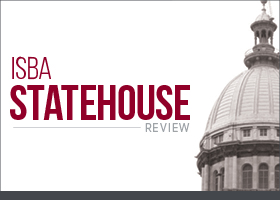ISBA Statehouse Review for April 24, 2019
 ISBA Director of Legislative Affairs Jim Covington reviews legislation in Springfield of interest to ISBA members. This week he covers condos and associations, special interrogatory, the Home Repair and Remodeling Act, the Condominium Property Act, consumer debt and collections, DUI, and student interrogation.
ISBA Director of Legislative Affairs Jim Covington reviews legislation in Springfield of interest to ISBA members. This week he covers condos and associations, special interrogatory, the Home Repair and Remodeling Act, the Condominium Property Act, consumer debt and collections, DUI, and student interrogation.
Condos and associations. House Bill 29 (Thapedi, D-Chicago; Collins, D-Chicago) amends the Common Interest Community Association Act to limit the concurrent exercise by units of local government affecting community instruments and accounting practices if inconsistent with state law.
It also amends the Condominium Property Act to limit the concurrent exercise by units of local government of powers and functions exercised by the state affecting an association’s budgeting practices, sale of property, notice requirements, contracts with board members, voting procedures, property improvement procedures, accounting practices, collection and sharing of records, amendment to the condominium instruments, and subdivision or combination of units.
House Bill 29 has passed the House and is in the Senate.
Special interrogatory. House Bill 2233 (Thapedi, D-Chicago; Mulroe, D-Chicago) amends the special interrogatory provision in the Code of Civil Procedure to do the following: (1) Makes it discretionary with the court on whether to give a special interrogatory if requested by any party. It is now mandatory if any party requests. (2) The appellate standard to review a trial court’s decision on whether to give a special interrogatory is abuse of discretion. (3) If a special finding of fact is inconsistent with the general verdict, the court is required to direct the jury to further consider its answer and verdict. If the jury can’t render a general verdict consistent with the special finding, the court must order a new trial. (4) The parties are allowed to explain to the jury what may result if the general verdict is inconsistent with any special finding. (5) This amendment will apply to trials commencing on or after Jan. 1, 2020.
House Bill 2233 has passed the House and is scheduled for hearing in the next two weeks in Senate Judiciary Committee.
Home Repair and Remodeling Act. House Bill 2643 (Mason, D-Gurnee; Bush, D-Grayslake) provides that a consumer age 65 and older has 15, rather than three, business days within which to cancel a contract if the sale is made at the consumer’s home.
House Bill 2643 has passed the House and now is in the Senate.
Condominium Property Act. Senate Bill 220 (Murphy, D-Des Plaines; Burke, D-Oak Lawn) must first provide the unit owner a minimum of 20 days’ written notice and an opportunity to be heard before the board may levy a fine. It also requires that the written notice must be made in compliance with the Act. These requirements apply only to the ability to levy fines, and nothing contained in the new provisions limits or restricts the ability of the board to pursue or enforce the rights of the association. It provides that the association has no authority to report adverse information to a credit reporting agency or initiate collection proceedings against a unit owner for unpaid fines unless the board of managers has first complied with these requirements.
Senate Bill 220 has passed the Senate and now is in the House
Consumer debt and collections. House Bill 88 (Guzzardi, D-Chicago; John Cullerton, D-Chicago) provides that a “consumer debt judgment” of $25,000 or less draws interest at the rate of 5% per annum. A consumer debt judgment may be revived by filing a petition to revive the consumer debt judgment no later than 10 years after its entry and by serving the petition and entering a court order for revival. If a judgment or consumer debt judgment becomes dormant during an enforcement proceeding against wages under specified Articles, the enforcement may continue to conclusion if the enforcement is done under court supervision and includes a wage deduction order or turn over order and is against an employer, garnishee, or other third party respondent.
House Bill 88 has passed the House and is now in the Senate.
DUI. House Bill 3226 (Connor, D-Crest Hill; Morrison; D-Deerfield) defines a DUI “first offender” as any person who, within 10 years (rather than five years) before the date of the current offense, has not had a driver’s license suspension or revocation for refusing to submit to a blood, breath, or chemical test for a DUI charge.
House Bill 3226 has passed the House and now is in the Senate.
DUI. House Bill 2200 (D’Amico, D-Chicago; Morrison, D-Deerfield) provides that any court order rescinding a statutory summary suspension or revocation must contain a factual basis for rescission. If it does not, the Secretary of State must return the order to the court and prohibits a rescission until the secretary receives a court order containing a factual basis for the rescission.
House Bill 2200 has passed the House and is now in the Senate.
Student interrogation. House Bill 2627 (Kifowit, D-Aurora; Castro, D-Elgin) prohibits a student under 18 years of age from being questioned or detained by law enforcement personnel, a school resource officer, or other security personnel on school grounds for suspected or alleged criminal activity without the presence of the student’s parent or guardian or a designee requested by the parent or guardian. Allows a student 18 years of age or older to request the presence of his or her parent or guardian if he or she is questioned or detained, and the student must be notified of this right.
House Bill 2627 has passed the House and now is in the Senate.

